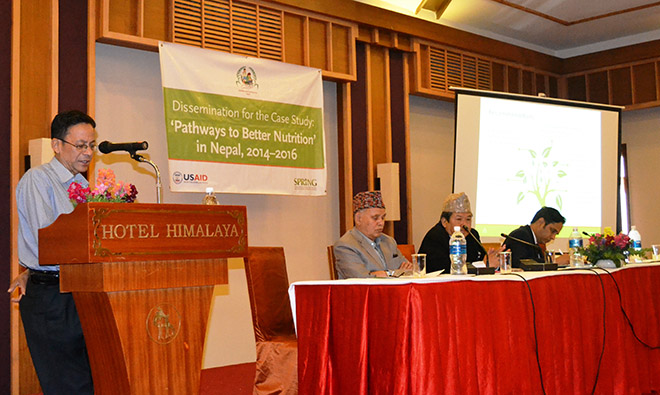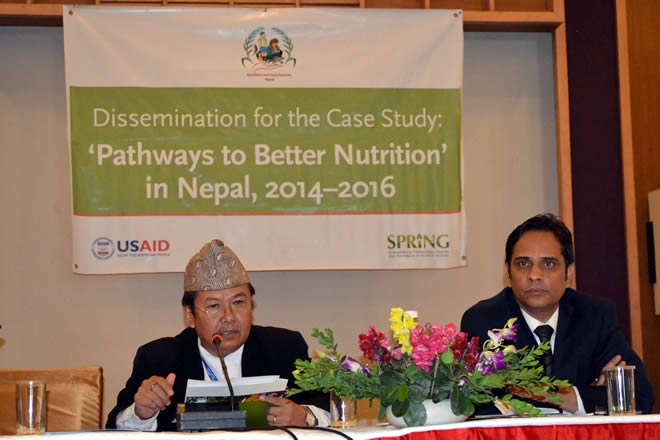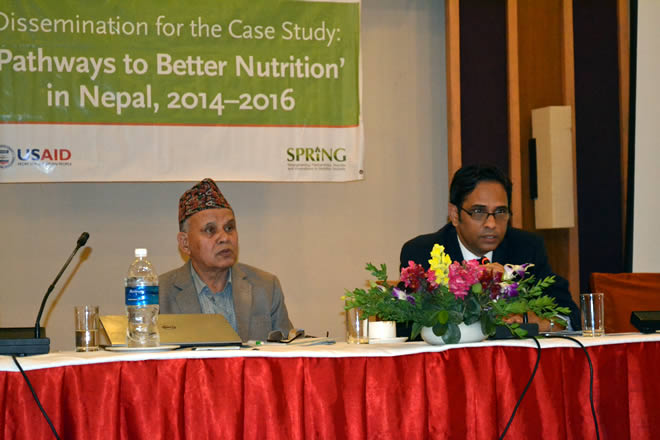
SPRING released findings from the multi-sectoral Pathways to Better Nutrition (PBN) Case Study during a national event in Kathmandu, Nepal on April 20th, 2016. The National Planning Commission (NPC) chaired the event. There were over 60 participants representing multiple government ministries, donors, UN groups, civil society, academia, and the private sector.

Chief guest Professor Geeta Bhakta Joshi (NPC Honorable Member) opened the event with a call for participants to consider how this information could be used in their regular planning for nutrition – “We should ask what can we as champions of MSNP do to further support for nutrition.”
SPRING PBN team members Amanda Pomeroy-Stevens, Madhukar B. Shrestha, and Kusum Hachhethu presented SPRING’s findings from data collected between June 2014 and November 2015 at the national level (district level results for Achham, Kapilvastu and Parsa were presented earlier this year. The findings were based on mixed method, objective, time-series analysis of the implementation of the multi-sectoral nutrition plan (MSNP), and found that prioritization and funding for nutrition had indeed increased for many stakeholder groups during the study timeframe. Based on these findings, as well as suggestions given by key informants and relevant global guidance, SPRING concluded the presentation by providing practical recommendations for how to address bottlenecks in the remaining years of the MSNP and beyond.

Mr. Madhu Kumar Marasini, Joint Secretary of the NPC and chair of this event, noted that many of the factors identified by the PBN study that increase prioritization and funding for nutrition are also needed to reach Nepal’s Sustainable Development Goals (SDGs) – “by combining [MSNP stakeholder] efforts; we can multiply the results. The fundamental principle of MSNP is also the same.” He noted that the study recommendations will be very helpful in achieving these goals and in the current development of the next three-year plan.
Before closing the event, Former NPC Honorable Member, Dr. Yagya Karki chaired a panel of representatives from Achham and Kapilvastu who provided reactions to the district and Village Development Committee results, and oversaw a lively feedback session among participants. In his closing remarks, Dr. Karki noted that this study provided useful information based on solid empirical evidence that can be used for forward planning. He urged all stakeholders to keep in mind the bigger picture of improved nutrition for every woman and child – “We are bogged down with so many processes but we should find the ways to reach the problems and address them.”
Photo at top: Co-Investigator Madhukar B. Shrestha presents the recommendations of the PBN Nepal case study alongside the Hon. Member, Former Hon. Member, and Joint Secretary of the National Planning Commission.